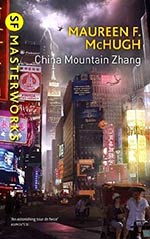
![]() thecynicalromantic
thecynicalromantic
4/29/2015
![]()
I picked up Maureen F. McHugh's China Mountain Zhang for a book club where, predictably, I missed the meeting because I hadn't finished the book in time. This happens entirely too often. Oh well.
The book, published in the early '90s, is a sort of cyberpunky near-future thing in which Chinese communism beats out Western capitalism as the dominant world system, where China is the world's only superpower and the U.S. has become a sort of backwater-y semi-colonial state after something called the Cleansing Winds campaign. The book is structured as a series of vignettes detailing the lives of a loosely connected network of characters, of whom the central and most-frequently-recurring one is a half-Chinese, half-Latino American man named Rafael Luis or Zhang Zhong Shan. Zhang looks purely Chinese due to some now-illegal gene splicing stuff, which gives him an advantage in a China-centric society; he is also gay, which gives him some disadvantages, since in this version of the future gay rights have not advanced one whit since 1992. The book follows Zhang from his beginnings as a construction tech in Brooklyn through a series of career and personal events, including a contract job on an Arctic research base, a stint as an engineering student in China, and attempts to get work in New York again now that he is basically overqualified for everything there.
Other characters include some kite fliers, a pair of colonists on Mars, and Zhang's former boss's daughter who has a bone disease that disfigures her face. All of their stories are seamlessly worked in with the technological advances of the world--kite racing a sort of flying-bodysuit sport where the audience "jacks in" to fliers to experience what they experience; the colonists on Mars are having issues with the systems that keep their colony livable; the daughter gets an advanced medical treatment that regrows all the bones in her face and discovers how different life is for pretty girls than ugly ones (somewhat predictably, she gets assaulted on a date). Zhang becomes something called an "organic engineer," which is apparently like a cross between systems engineering and architecture, except more Daoist. (It makes sense in the book.)
Characterization and worldbuilding are key here, so the book only works because they're both so very well done and so very well-integrated with one another. There's not a huge amount of plot; Zhang has a sort of coming-of-age arc thing going on but it's a slowly developing career path, not a "Saves the world and finds out who he really is at the same time" action-adventure story. And apart from a creepily accurate prediction of a Second Great Depression in the U.S. at the beginning of the twenty-first century--although this one supposedly had something to do with trade balances--I can't really weigh in on how plausible a vision of the future it is. But it feels plausible, and real, and immersive, and for that it's a good read. Everything--fashion, technology, language, setting--is very detailed, except the beer, which is always just described as "beer" and on the rare occasions it is a type of beer the characters drinking it don't care, which sounds weird to me but that might be a quirk of when and where I live.
I was worried going into this that it would end up with some flavor of the paranoid Cold War propaganda that infests a lot of older sci-fi--instead, life under Chinese communism appears to have a lot in common with life under punitively-minded Western capitalism in an economic slump. Zhang deals with unemployment, the difficulties of gaining an education, problems of then being overqualified once the education is obtained, government bureaucracies, gentrification, housing instability, officially-nonexistent class issues, running out of money--all the usual stressful BS of being a young, single urbanite. In this way it was a little depressing, because, man, I do not need to read books to experience being unemployed and scrambling to pay rent in a crappy shoebox apartment in a gritty city. Although at least Zhang lives alone most of the time.
I liked this book, but I think I'm gonna read something a bit more escapist next.
http://bloodygranuaile.livejournal.com/65341.html